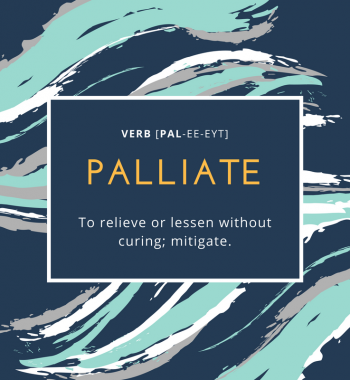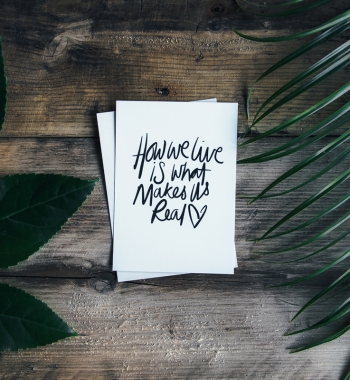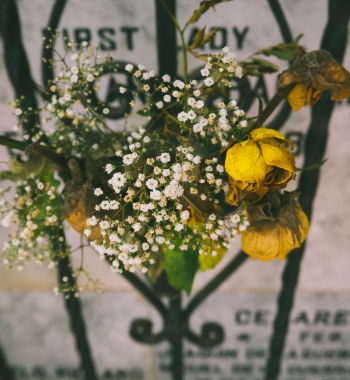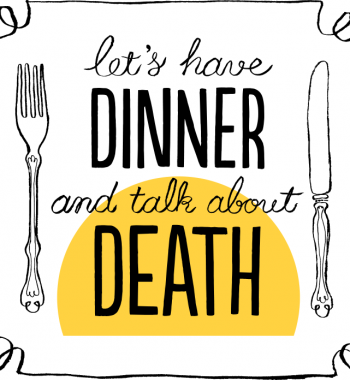
Let's have Dinner and Talk About Death
Tuesday 8th August was Dying to Know Day, and so I decided that it would be the perfect opportunity to host a Death Over Dinner: a meal over which people are brought together to talk about end of life wishes.
It may sound morbid, but having started this journey at Grand & Grave of exploring our death literacy it felt as though hosting this type of occasion was a natural step forward. It was time to open up the conversation to those around me, widening the awareness of how important it is to talk about what our Western society all too often shies away from.
Yes it was slightly daunting to send out the invites, and I had some nerves on the night about how easily and openly everyone would talk, but it turns out that there was absolutely no need for any apprehension…
What to Expect:
The process of setting up the dinner was simple. I visited the Death Over Dinner website, filled out a quick online form which included me selecting a reading, listening and video for my guests to receive in preparation for the evening, and then up popped an email in my inbox with an invite to send out to guests and a conversation guide for the evening.
The conversation guide that I received was based on the type of guests I was inviting and which prep pieces I had selected. To make the evening a little less nerve-wracking for those attending (as well as taking the pressure off being the one guiding the conversation on the night) I used the significant prompts from the email to create a Death Over Dinner Menu. This proved highly useful throughout the evening.
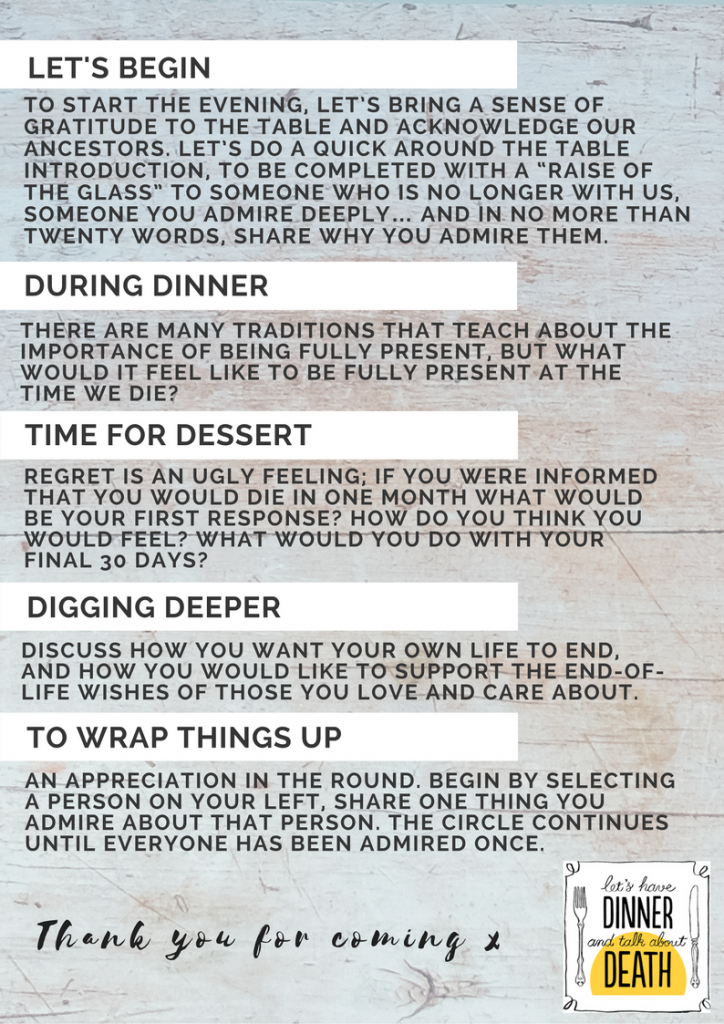
On the Night:
The table was laid, the food prepared, and my small group of dinner guests arrived. We were a mix: a couple, an old friend and newly made connections. But the unifying link of curiosity about our dinner’s subject matter meant that conversation flowed easily.
Gathering in the living room over a drink, we quickly dropped into talking about why we were there and how it all came about. Soon enough we had engrossed ourselves in conversation and I quickly realised that this was not a dinner to be had sat formally around a dining table. The relaxed nature of our seating choices, the low lights and cosy feel of the room had each of us creating a space for ourselves that felt safe, and that was what was most important when broaching subjects that have the potential to be daunting and sad.
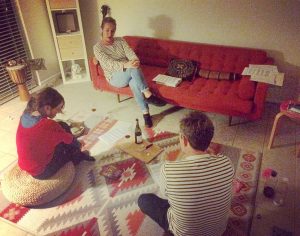
So with this in mind, I brought out a light starter for everyone and we embarked on our first prompt: raising a glass to someone who is no longer with us. We used more than the suggested twenty words; we had laughs; we had tears. And any barriers that may have been up came tumbling down.
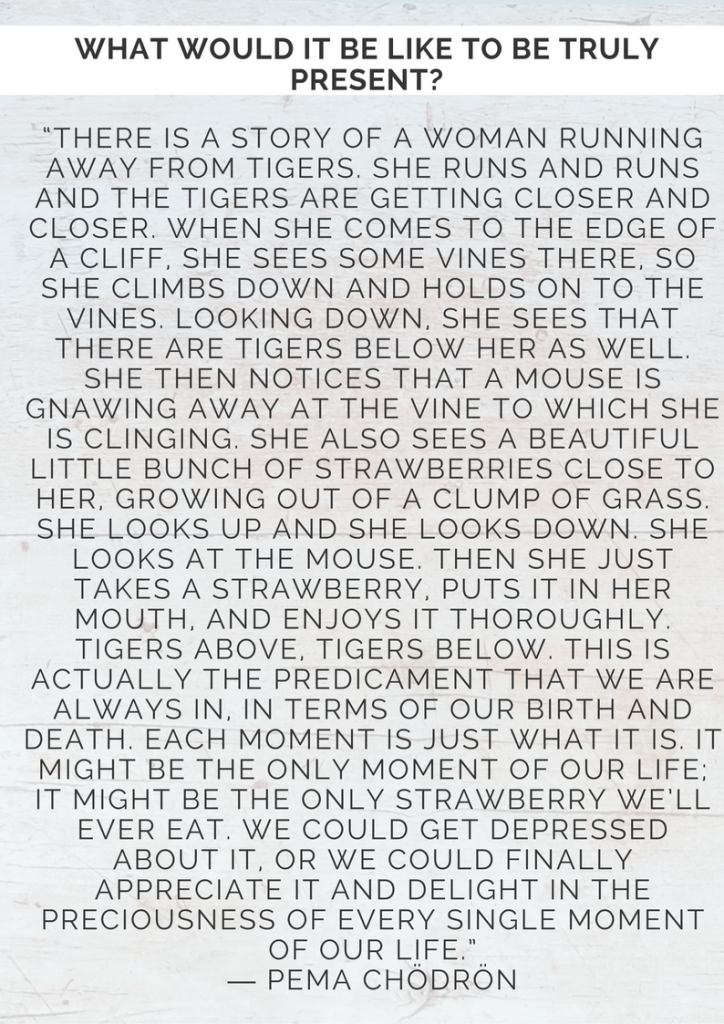
As the evening progressed we continued to follow the prompts on our “conversation menu”. These naturally fell into place as we spoke, and were also a good way in which to draw the conversation back on track when perhaps we would sometimes wander slightly astray.
From the practical to the emotional, we were open and respectful, listening intently and laughing uncontrollably. We explored our own experiences, stories we had heard, and questions that we did not know the answers too.
Top Tip: If you are hosting, don’t plan to serve any food that is complicated to plate. Pick something comforting yet light – a one pot dish is perfect – as you won’t want to disrupt the flow of conversation or tear yourself away from the group for too long.
The conversation could have continued far into the early hours of the morning, but it was time to wrap things up. As we embarked upon the last prompt: an appreciation in the round, we found this in some ways to be the hardest part. Admiration is a bold word, and openly sharing this in some ways left you feeling more exposed than when talking about death itself, and yet it was an important part of the evening that in no way could have been skipped.
As we prepared to disperse I handed out one last thing: a Final Checklist. A one page document for my guests to take home, created by The Groundswell Project for Dying to Know Day, highlighting practical points surrounding planning for your end of life. It ended up reigniting our conversations, prompting topics that we hadn’t ever thought about before.
In Conclusion:
I would host another Death Over Dinner in an instant. It was interesting to see how our conversations this time round only lightly touched upon what we would like to happen to ourselves, and instead focused mostly on other people’s experiences of dying, but I think this was important. The planning of your own end of life is a much larger topic emotionally, and one that we all felt we would be better equipped for discussing after the digestion of our dinner in the following days. We agreed upon checking in again as a group for a follow up Death Over Dinner later in the year, in which I can imagine the practicalities of our own deaths may feature more heavily in conversation.
In the meantime, I look forward to exploring the words that we shared over our dinner. And hope to host another Death Over Dinner with a different group of friends or family in the future – an experience that I believe most people would be pleasantly surprised by.

